
Sample Application Letter for School Admission for Child
In this guide, I’ll walk you through a step-by-step process, share a customizable template, and offer personal tips from my experience to help you create an effective application letter.
Key Takeaways Understanding the Purpose : Grasp the significance of the application letter in the school admission process. Personalizing the Content : Learn how to tailor the letter to highlight your child’s unique attributes and potential contributions to the school. Structuring the Letter : A step-by-step guide on the components of the letter. Template Usage : Access to a customizable template to simplify your writing process. Expert Tips : Benefit from insights and tips based on real-life experiences in writing successful application letters.
Understanding the Purpose of the Application Letter
The application letter is your opportunity to present your child in a way that goes beyond grades and certificates. It’s about telling a story, your child’s story, and how it aligns with the values and ethos of the prospective school.
Personal Insights
In my experience, schools are looking for students who will not only benefit from but also contribute to the school’s environment. Hence, understanding the school’s values and ethos is crucial before you start writing.
Step-by-Step Guide to Writing the Letter
Step 1: research the school.
Before you start writing, research the school. Understand its values, what it stands for, and what it seeks in its students. This information will be the foundation of your letter.
Step 2: Start with a Strong Opening
Begin with a compelling introduction that captures the essence of your child’s personality or a significant achievement that aligns with the school’s values.
Example : “When Jane solved her first complex math puzzle, it wasn’t just about numbers; it was about problem-solving, perseverance, and the joy of learning – qualities that resonate with [School’s Name] ethos.”
Step 3: Highlight Key Attributes and Achievements
Discuss your child’s attributes, interests, and accomplishments. Connect these with how they can contribute to and benefit from the school.
Tip : Use specific examples to illustrate your points. Real-life instances make your letter more personal and impactful.
Step 4: Discuss the Alignment with the School’s Values
Explain why the school’s environment is the ideal setting for your child’s growth and how their presence can enhance the school community.
Step 5: Conclude Positively
End with a positive note, expressing enthusiasm about the possibility of your child joining the school community.
Template for Application Letter for School Admission
[Your Name] [Your Address] [City, State, Zip Code] [Email Address] [Phone Number] [Date]
[Recipient’s Name] [School’s Name] [School’s Address] [City, State, Zip Code]
Dear [Recipient’s Name],
I am writing to express my child, [Child’s Name]’s, interest in joining [School’s Name] for [Grade/Year]. [Introduction – Briefly introduce your child and mention a standout quality or achievement relevant to the school’s ethos].
[Body Paragraph 1 – Discuss your child’s key attributes, interests, and how they align with the school’s values and offerings].
[Body Paragraph 2 – Highlight your child’s achievements and how they can contribute to and benefit from the school environment].
In conclusion, [Child’s Name]’s passion for [Key Interest] and their [Key Attribute] make them a fitting candidate for [School’s Name]. We are enthusiastic about the prospect of [Child’s Name] becoming part of your school community and contributing to its vibrant atmosphere.
Thank you for considering our application. We look forward to the possibility of [Child’s Name] joining [School’s Name] and contributing to its esteemed legacy.
[Your Name]
Personal Tips from Experience
- Authenticity Matters : Schools can tell when a letter is genuine. Let your child’s personality shine through.
- Be Concise : While it’s important to be thorough, keep your letter concise and to the point.
- Proofread : Typos or grammatical errors can detract from your letter’s impact. Always proofread before sending.
Frequently Asked Questions (FAQs)
Q: how do i showcase my child’s unique talents in an application letter for school admission.
Answer : In my application letter, I highlighted my child’s unique talents by giving specific examples of their achievements and creativity, like the time they won a local art competition, which showed their exceptional skills and passion for the arts.
Q: What should I include in the application letter to express my child’s enthusiasm for learning?
Answer : I made sure to include anecdotes of my child’s natural curiosity and eagerness to learn, such as their endless questions about space, which demonstrate their genuine interest in acquiring knowledge.
Q: How can I address my child’s special needs in the application letter?
Answer : In the letter, I openly discussed my child’s special needs, emphasizing how they’ve overcome challenges with resilience and determination, which I believe showcases their strength and character.
Q: Is it important to mention my child’s extracurricular activities in the school admissions application letter?
Answer : Absolutely, I included details about my child’s involvement in sports and music, illustrating their well-rounded character and teamwork skills, which are crucial for their overall development.
Q: How can I make my child’s application letter stand out to the admissions committee?
Answer : I added a personal touch by sharing a heartfelt story about my child’s kindness and empathy during a community service event, which not only reflects their character but also their potential as a valuable community member at the school.
Q: Can I discuss my child’s academic achievements in the application letter for school admission?
Answer : Yes, I showcased my child’s academic prowess by mentioning their consistent honor roll status and their inquisitive nature in class discussions, which highlights their intellectual capabilities and engagement in learning.
Q: How do I explain the reason for choosing a particular school in the application letter?
Answer : I articulated our family’s decision by explaining how the school’s unique approach to education aligns with my child’s learning style and interests, like their emphasis on experiential learning that suits my child’s hands-on learning preference.
Related Articles
Sample teacher request letter to principal from parent, parent introduction letter to teacher sample: free & effective, sample request letter for documents in school: free & effective, co-parenting agreement letter sample: free & effective, short parenting letter to kids: free & effective, simple request letter sample for school, leave a comment cancel reply.
Your email address will not be published. Required fields are marked *

College Application Letters: Cover Letters & Letters of Continued Interest
College Application Letters
College application cover letters support your college applications, college resume, and college application essay prompts. In combination with the other elements of your college applications, particularly your college entrance essay, college application letters help establish your “why.” In short, a college application letter is a cover letter for your college applications that describes your background, skills, and interest in the school. When looking at college application cover letter examples, pay attention to the values that they express. College application letters and college entrance essays are similar in that they are exercises in personal branding. When reading college application cover letter examples, pay attention to the messages they convey.
If you’re wondering how to write a college application letter, CollegeAdvisor.com has advisors who can walk you through every part of the process. If your goal is to get into top colleges, CollegeAdvisor.com can help. We’ll analyze examples of college application letters and discuss the letter of continued interest to help you craft successful applications.
In this guide, we’ll break down the different kinds of college application letters you may encounter when completing your college applications. We’ll discuss the college application letter and the letter of continued interest, as well as teacher recommendation letters.
If you want to read college application cover letter samples, you’ve come to the right place!
What is a college application letter?
To learn how to write a college application letter, you must first understand its purpose. Do this by checking out college application cover letter examples. College application letters and college resumes serve as introductions for your college applications. Unlike college application essay prompts, there are no specific questions to answer in your cover letter. Instead, include the essential elements of university application letters: your background, what makes you unique, and your reasons for wanting to attend that particular college. In short, what makes you, you .
As you’ll see when reading example college application letters, college application cover letters are not all that different from what you would write in a cover letter when applying for a job or graduate school. The purpose of college application cover letters, college entrance essays, and college resumes is to persuade colleges that you are the strongest candidate for admissions.
College application cover letters are not the time to be shy, but they’re not the time to be pretentious either. When reading college application cover letter examples, you’ll see that there’s a fine line. Your tone matters. In your university application letters, show your experiences and accomplishments while portraying character traits that colleges value. To get into top colleges, find a balance between being proud of your accomplishments and being humble.
College application letters – Who requires them?
Unlike college entrance essays, college application letters are required by very few colleges. However, the skills you’ll develop by writing university application letters will serve you well as you approach your college application essay prompts. When researching college application examples, you’ll notice that there are optional materials to submit. If you’re serious about your college applications, submit university application letters to show your interest.
College application cover letters are particularly effective if the college does not have college application essay prompts that ask you to explain why you want to attend the school and/or why you want to study your major. They are even more strongly recommended when applying to colleges that don’t have any supplemental essays. You’ll see many college application cover letter examples that focus primarily on academics, but you can include so much more.
Though university application letters are rarely required, they provide an ideal way to introduce yourself. After all, you’ll notice when reading college application cover letter samples that the goal is to help the admissions committee get to know you as a person. You are more than just your grades and scores.
If you want to get into top colleges that don’t allow you to submit a college resume or don’t provide interviews, you need to take extra steps to earn acceptance. Often, you can repurpose content from college application essay prompts that ask why you want to study your major! The college application essay format differs from that of a college application letter, but they serve a very similar purpose.
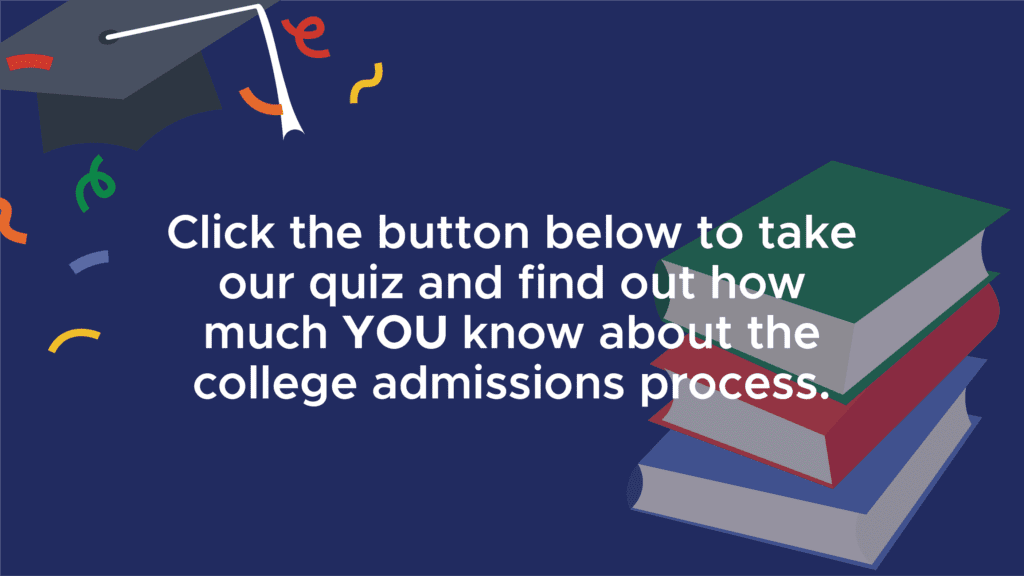
What is a letter of continued interest?
A letter of continued interest (LOCI) is a letter you send to a college when you are deferred or placed on the waitlist. So, not everyone will need to write a college application letter of continued interest.
Your letter of continued interest has three primary goals:
- Reaffirm your interest in the school.
- Provide additional context for your application.
- Discuss accomplishments on your college resume that have occurred since you submitted your application.
In this guide on how to write a college application letter, we discuss all forms of college application letters in detail. We’ll expand on the above goals to explain the strategies for writing effective letters.
Explaining teacher recommendation letters
In addition to submitting a college application cover letter and, potentially, a letter of continued interest, your application will also include recommendation letters . These letters enhance your college application entrance essay and build on answers to supplemental college application essay prompts.
Due to the shift away from standardized testing, other parts of your college applications are inevitably getting more attention in the evaluation process. When assessing your college applications, admissions committees will often rely on letters from your teachers and counselor in place of interviews.
When reading sample college application letters of recommendation, you’ll observe that some are better than others. But, it can be a bit harder to find example teacher recommendations than it is to find college application cover letter examples. To ensure high-quality letters, create a plan well in advance of your senior year. You’ll want to ask teachers to write your recommendations who know you best beyond your grades. The strongest sample college application letters of recommendation speak to both your personal and academic strengths.
College application sample recommendation letters with the biggest impact typically come from teachers from your core junior year courses – math, science, English, and social studies. If there’s a teacher from your junior year who taught you during your sophomore or senior year too, even better! Teachers who know you through multiple environments – clubs, classes, sports, or other areas – can often do the best job speaking to your growth and achievement over time.
Choose teachers who know you best
Ultimately, the most effective sample college application letters of recommendation are written by the teachers who know you best. Pay attention to the college application requirements for each school on your list. Note when reading example college application letters of recommendation who the intended audience is. Some schools require math or science teachers for STEM and business majors , while others require English or social studies teachers for humanities majors .
For example, when looking at college application sample requirements, MIT writes “One recommendation should be from a math or science teacher, and one should be from a humanities, social science, or language teacher.” Caltech also requires one math or science teacher evaluation and one humanities or social sciences teacher evaluation.
Some applicants are tempted to send more letters than the college applications require. However, aim for quality over quantity. If you want to ask another teacher to write a recommendation letter for you, ask yourself what perspective they will bring to your college applications that isn’t already covered in your college entrance essay or other recommendation letters.
Don’t hesitate to provide materials to help your teachers and guidance counselor write their letters of recommendation for you. In fact, you should! When reading college application sample letters of recommendation, you’ll note that they are specific and provide examples where possible. Some teachers will even have you fill out a standard form to gather information from you. So, by having additional information already prepared, you are helping them tremendously.
Here are some materials you can provide to help your recommendations augment your college applications:
- College entrance essay
- College resume or a list of your extracurricular activities and awards
- Responses to college application essay prompts.
- A sample college application letter that you’re sending to one of your colleges.
- A few paragraphs about why you want to study your major or pursue your intended career.
- Key elements of the course you took with them, such as a favorite project or unit.
When preparing materials to give to teachers, read the instructions given to recommenders by MIT. Even if you aren’t applying to MIT, the information can still be helpful to know. By understanding the process of writing recommendation letters on the teacher’s side, you can see what information will help them write a strong letter for you.
Don’t wait until you’re submitting your college applications to ask your teachers for recommendations. Some teachers limit the number that they will write, and you want them to have plenty of time to write a quality recommendation. To make sure you have the best recommendations , ask teachers late in your junior year or early in your senior year.
The College Application Letter
As we’ve mentioned, a college application letter is a cover letter for your college applications. It describes your background, skills, and interest in the school. It’s different from both the college application essay format and the letter of continued interest. When reviewing college application samples, you’ll see that your cover letter works together with your college resume and college entrance essay to help admissions officers get to know you.
Below, we’ll discuss how to write a college application letter and walk through a sample college application letter. But remember, you want your letter to be original! Don’t feel limited by what’s in any examples of college application letters.
Do all schools require a college application letter?
No — few schools actually require college application letters. However, learning to write a strong college application letter can help you in other aspects of the college admissions process. Reading college application cover letter examples can also help you learn how to write for the admissions committee audience.
One of the ways to learn how to write a college application letter is to read sample college application letters. For instance, the same skills that help you write a strong and concise college application letter will help you in the college essay format, too.
The college application letter – What should I include?
So, you know the purpose of college application letters, but what should you include in them? Reading college application cover letter samples can help you determine this. While the college application essay format lends itself to focusing on one topic or story, college application cover letter examples highlight the importance of covering several different topics.
College application letters should contain the following elements:
1. school name and address.
You college application letter should follow formal letter formatting guidelines, which include writing the full name of the college or university you are applying to in the upper left hand corner of the letter. Try to be as specific as possible with the address you choose to use.
2. Salutation
A standard salutation is suitable for your college application letter. However, it is a great idea to do your research and use the full name of the admissions officer assigned to your region.
3. Introduction
The best examples of college application letters open strong. Thank the admissions committee for reviewing your application, and introduce yourself. Do you have a unique connection to the school? Can you hook the reader in some way to make them want to keep reading?
4. Explanation of academic interests
Your primary purpose in college is to earn a degree, so notice that in example college application letters most of the space is often devoted to discussing academic plans. Include your intended major and career path, as well as interdisciplinary interests.
5. Discussion of extracurricular interests
The college application essay format may be a place for you to discuss extracurricular involvement, so use this space to elaborate or discuss additional interests. These could be connected to your academic plans, but they don’t have to be.
6. Conclusion
Express your interest in the school! Impactful example college application letters have a clear and brief conclusion that reaffirms your desire to attend and enthusiasm for the opportunity to join the next class of undergraduates. Point to specific classes, professors, programs, organizations, and aspects of the college that pique your interest. No one is going to hold you to your plan, but colleges want to see that you have one.
8. Complimentary Close
Lastly, every good college application letter should include an expression of gratitude alongside your close and your signature.
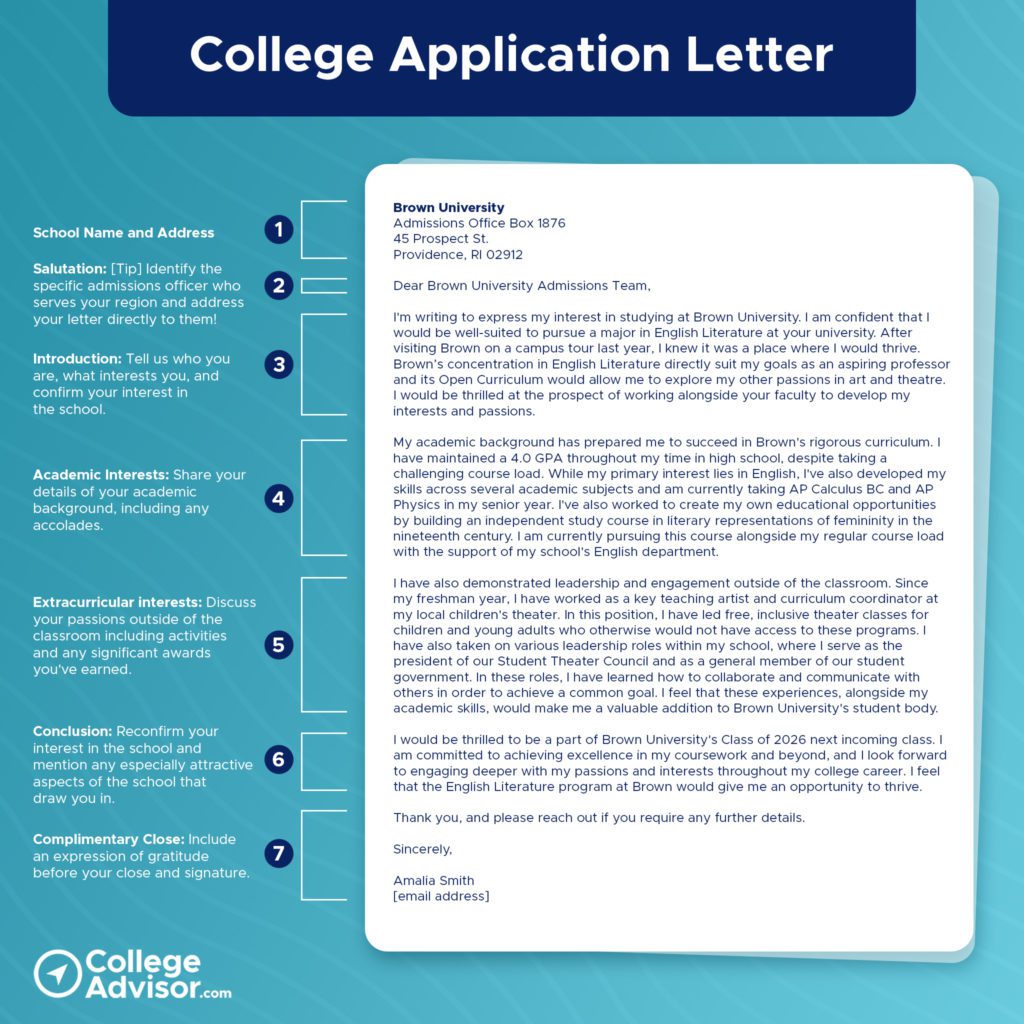
In the example of a college application letter above, there are a few key details to highlight. The letter is essentially a five-paragraph essay, with one paragraph for each of the five elements. This differs significantly from the college application essay format. In this college application example, the college application letter has clear and distinct sections, and this is very common in college application cover letter samples.
Depending on your interests and plans, you could take a more integrated approach. You’ll read some examples of college application letters that center around a theme or broad plan rather than separated into individual paragraphs.
This sample college application letter is a narrative. The applicant’s goal is to tell her story to the admissions committee. The best sample college application letters paint a picture for the reader and draw the reader into the storyline. Though it can feel like being vivid and descriptive is a waste of your space, “showing instead of telling makes for stronger college applications.
How to format your college application letter?
When reading sample college application letters, you’ll observe that they are formatted very similarly to professional cover letters. Your university application letters should be one page single-spaced. The heading should also be consistent across college application letters.
- Your full address
- The date you will send the letter
- The admission officer’s name
- The college name
- The college address
Then, open your letter with a salutation. Many examples of college application letters open with “Dear” and are addressed to the admission officer. If you cannot find your regional admissions officer, it is fine to address the letter to the admissions office as was done in the sample college application letter above. Once you write the body of your letter, don’t forget your closing salutation – “Sincerely,” and then your name.
Once you read several sample college application letters, you’ll understand the best practices. After writing a university application letter for one school, you don’t need to start from scratch for additional schools. Adapt what you have to fit the next college’s context and your specific interests on their campus.
Being concise is key. Your university application letter should not be redundant. If it exceeds one page, see where information you mention is repeated elsewhere in your application. In your cover letter, focus on the content that makes you as original and unique as possible. Most importantly, don’t forget to proofread your university application letters!
Can a college application letter help me with other parts of my application?
Think of the college application cover letter as the glue that holds your college applications together. When writing it, think about it as your opportunity to show your best self. After brainstorming the content, you’ll be better equipped to craft your candidate profile into a cohesive narrative and articulate why you want to attend the college.
Though many parts of your college applications will be out of your control by the time you reach your senior fall, the college application cover letter is one that you can control. Use it to elevate your college applications, show interest in your top schools , and make yourself stand out among other applicants!

The Letter of Continued Interest
Another form of college application letter is a letter of continued interest . In sample college application letters of continued interest, you’ll see that the primary purpose is to reaffirm your candidacy for a spot in the next incoming class of undergraduates.
Though it can feel like a waiting game, the waitlist should not be passive. As soon as you are waitlisted or deferred, begin crafting a letter of continued interest. The best college application sample LOCIs are submitted promptly. Put in the effort to show you’re serious about attending.
College application example LOCIs should focus on recent updates. Likely, a lot has happened since you submitted your application, particularly if you applied by the early deadlines. Strong college application sample LOCIs convey accomplishments and experiences that either add to previously mentioned ones or provide another dimension to your application.
Letter of continued interest – When and where to submit?
Learn as much as you can by reading college application example LOCIs, but know that each school’s process for when and how to submit them is different. Additionally, the process may vary based on whether you were deferred to the regular decision round of admissions or waitlisted after the regular decision round. It’s important to follow each university’s directions.
Many schools will request that you upload your letter of continued interest to a portal. Some will request that you email it to an address – typically the admissions office. Others won’t allow you to submit any additional materials. If you’re in doubt, call or email the admissions office and ask.
What to include in your letter of continued interest?
You’ll notice common trends when reading college application sample LOCIs. Effective college application example LOCIs convey a tone of sincerity, gratitude, and enthusiasm for an opportunity to attend. A strong sample college application letter of continued interest includes four elements.
First, reaffirm your interest in attending the school if offered the chance to matriculate. Then, discuss relevant developments to your application, such as additional extracurricular accolades and continued academic successes. Sometimes, you’ll see a sample college application letter of continued interest that mentions how a student improved a lower mid-year grade or discusses a new leadership role.
When reading a sample college application letter of continued interest, remember that colleges are looking for reasons to admit you, so don’t be shy! Offer to answer any questions they have and provide additional info in the conclusion of your letter.
It’s important to back up your claims with supporting evidence. Strong college application sample LOCIs provide examples and specific details, just as you would in a cover letter or essay. Be vivid and descriptive as you share your story!
However, college application example LOCIs that include overly emotional appeals or merely complement the university are unlikely to be effective. Your letter of continued interest should be all about you. Though it can be difficult to realize this when reading college application example LOCIs, recognize that the content of your letter should fit within the context of the rest of your application.
The many types of college application letters – Final Thoughts
In this guide, we covered several types of letters associated with your college process – college application cover letters, teacher recommendation letters, and letters of continued interest. Reading sample college application letters, whether they are college application cover letter samples or LOCIs, can help you do your best work. But, remember that every applicant’s college application process is unique.
Our final tips for writing college application letters:
- Proofread. College application letters with typos or grammatical errors reflect poorly on your effort and candidacy. Use a polished and professional tone in everything you write for your college applications.
- Be yourself. Though this goal can get lost in the requirements, scores, and grades, you should focus on helping the colleges on your list get to know who you are .
- Follow the requirements. Each college has their own requirements for how they want you to submit materials. Pay close attention to the details for each college as you go through the admissions process.
CollegeAdvisor.com can help guide you through every step of the college application process. Check out our blog , webinars , or register with CollegeAdvisor.com today. Good luck!

This guide to college application letters and letters of continued interest was written by Caroline Marapese, Notre Dame ‘22. At CollegeAdvisor, we have built our reputation by providing comprehensive information that offers real assistance to students. If you want to get help with your college applications from CollegeAdvisor.com Admissions Experts , click here to schedule a free meeting with one of our Admissions Specialists. During your meeting, our team will discuss your profile and help you find targeted ways to increase your admissions odds at top schools. We’ll also answer any questions and discuss how CollegeAdvisor.com can support you in the college application process.
Personalized and effective college advising for high school students.
- Advisor Application
- Popular Colleges
- Privacy Policy and Cookie Notice
- Student Login
- California Privacy Notice
- Terms and Conditions
- Your Privacy Choices
By using the College Advisor site and/or working with College Advisor, you agree to our updated Terms and Conditions and Privacy Policy , including an arbitration clause that covers any disputes relating to our policies and your use of our products and services.
- PRO Courses Guides New Tech Help Pro Expert Videos About wikiHow Pro Upgrade Sign In
- EDIT Edit this Article
- EXPLORE Tech Help Pro About Us Random Article Quizzes Request a New Article Community Dashboard This Or That Game Popular Categories Arts and Entertainment Artwork Books Movies Computers and Electronics Computers Phone Skills Technology Hacks Health Men's Health Mental Health Women's Health Relationships Dating Love Relationship Issues Hobbies and Crafts Crafts Drawing Games Education & Communication Communication Skills Personal Development Studying Personal Care and Style Fashion Hair Care Personal Hygiene Youth Personal Care School Stuff Dating All Categories Arts and Entertainment Finance and Business Home and Garden Relationship Quizzes Cars & Other Vehicles Food and Entertaining Personal Care and Style Sports and Fitness Computers and Electronics Health Pets and Animals Travel Education & Communication Hobbies and Crafts Philosophy and Religion Work World Family Life Holidays and Traditions Relationships Youth
- Browse Articles
- Learn Something New
- Quizzes Hot
- This Or That Game New
- Train Your Brain
- Explore More
- Support wikiHow
- About wikiHow
- Log in / Sign up
- Job Application Documents
- Cover Letters
How to Write an Application Letter
Last Updated: June 29, 2023 Fact Checked
This article was co-authored by Alexander Ruiz, M.Ed. . Alexander Ruiz is an Educational Consultant and the Educational Director of Link Educational Institute, a tutoring business based in Claremont, California that provides customizable educational plans, subject and test prep tutoring, and college application consulting. With over a decade and a half of experience in the education industry, Alexander coaches students to increase their self-awareness and emotional intelligence while achieving skills and the goal of achieving skills and higher education. He holds a BA in Psychology from Florida International University and an MA in Education from Georgia Southern University. There are 7 references cited in this article, which can be found at the bottom of the page. This article has been fact-checked, ensuring the accuracy of any cited facts and confirming the authority of its sources. This article has been viewed 166,730 times.
Application letters are typically written to accompany school or job applications. The purpose of the letter is to introduce yourself to the decision committee, and to outline your qualifications in a specific way. It can be the only time other than an interview that you have a chance to really stand out in an application, so it's important to get it right. You can learn what to include in your letter, how to style it, and how to format it to give yourself the best chance.
Application Letter Templates

Writing a Job Application

- A good example would be: "I'm writing to apply for the Chimney Sweep position advertised in Rolling Stone. I think my experience in the heating industry makes me uniquely qualified for this position. Please find my application materials and a brief description of my qualifications below."
- Don't write your name until the signature. It'll be in the header and in the sign-off, so there's no reason to put it in the body of the letter itself.

- Be specific. Who are you? Where do you come from? What's your story? These details are important. HR screeners read hundreds of these.
- Describe your ambitions. Where do you want to go? How will this opportunity help you get there?
- What skills and experiences make you the right fit? Be as specific as possible and avoid vague language. It's better to describe a time you solved a specific problem at your last job than to just write, "I'm a good problem solver at work."

- Tailor it to the business. If you're applying to work at a record store, you need to talk about music. If you're applying to work at a tech company that writes, "Tell us something totally rad about yourself!" it's probably ok to be a little more informal.

- Don't over-promise. Telling someone that you can guarantee that you'll be able to turn around their sales figures in six months or less is a good way to get fired in six months.

- Any kind of job requires this type of research. If you apply to a restaurant, you need to be familiar with the menu and the kind of customers the restaurant attracts. Consider eating there a few times before you apply.
- Don't show you're familiar by criticizing a business and telling them what you can do better. Not the time to offer a harsh criticism of a business plan that you don't really know anything about.
Writing a School Application

- Common prompts include things like, "Outline your qualifications for this position" or "In writing, explain how this position would affect your career goals." Sometimes, the prompt will be as short as, "Tell us something interesting about yourself."
- If there is no prompt, but you still feel the need to introduce your application with a letter, it's usually best to keep it as short as possible. Explain what you're applying for, why you're applying, and thank the contact for their consideration. That's it.

- Often, college prompts will ask you to describe a time you struggled, or a time you overcame some obstacle. Write about something unique, a time that you actually failed and dealt with the consequences.
- The board will get thousands–literally, thousands–of letters about someone's first mission trip, and letters about the time someone's sports team was beaten, then overcame the odds, and won again. Avoid these topics.

- Be specific. If you're writing to a college board, don't say, "I want to go to this college because I need a degree." That's obvious. What do you want to do with it? Why? If you're applying to a business, don't say, "I just need a job." That's obvious. Why this specific job?

- If you're applying to schools, what do you like about the school? What faculty are you interested in? Why this school, instead of another?
Formatting Application Letters

- If you don't get a word-count guideline, just focus on making one or two good points about yourself, and keeping it at that. No need to drone on four several pages.

- Instead of a salutation, write, "Letter of Application" at the top left corner of the page, or put it in the header on the left side at the top.
- If you do have a contact, address it to them, making sure the name is spelled correctly. Then space down and start the body of the letter. [10] X Research source

- Sometimes, it's appropriate to type your name, then print out the letter and sign it in pen. That can be a nice touch.

- Mailing address
- Telephone and/or fax number
Expert Q&A

- Remember to be formal at all times. Do not use abbreviations anywhere. Thanks Helpful 0 Not Helpful 1

You Might Also Like

- ↑ https://www.indeed.com/career-advice/finding-a-job/how-to-write-an-application-letter
- ↑ https://owl.purdue.edu/owl/subject_specific_writing/professional_technical_writing/tone_in_business_writing.html
- ↑ Alexander Ruiz, M.Ed.. Educational Consultant. Expert Interview. 18 June 2020.
- ↑ https://advice.writing.utoronto.ca/types-of-writing/admission-letters/
- ↑ https://wts.indiana.edu/writing-guides/personal-statements-and-application-letters.html
- ↑ https://owl.purdue.edu/owl/job_search_writing/job_search_letters/cover_letters_1_quick_tips/quick_formatting_tips.html
- ↑ https://writing.wisc.edu/handbook/assignments/coverletters/
About This Article

To format an application letter, start by including your name and contact details in the document header. When choosing a greeting, only use one if you know the person's name your writing to. Otherwise, give the document a title, like "Letter of application" at the top of the page. For the body of the letter, aim to write no more than 1 page of single-spaced paragraphs using a standard font. Finally, conclude your letter with a formal greeting like "Sincerely yours." For tips on how to write a job application letter, read on! Did this summary help you? Yes No
- Send fan mail to authors
Did this article help you?

Featured Articles

Trending Articles

Watch Articles

- Terms of Use
- Privacy Policy
- Do Not Sell or Share My Info
- Not Selling Info
wikiHow Tech Help Pro:
Level up your tech skills and stay ahead of the curve
Similar Letters
Application letter for school admission. sample letter, application letter for a nursing school. sample letter, letter of application for graduate school. sample letter, application letter for nursing school. sample letter, sample letter to ask about a program at a university abroad, letter example inquiring about a program for foreign nurses, letter to ask about an international exchange program, motivational letter sample for job application, letter of application for a teaching position. sample letter, letter of application for employment. sample letter, admission letter for college. sample letter, application letter for an internship. sample letter, college application letter. sample letter, application for leave from work sample letter, sample letter for work visa application for a job abroad, example letter of family visa application for wife, high school letter of recommendation, high school transcript request letter, reference letter for an applicant for college admission, sample letter of intent of job application, letter categories, application letter for high school. sample letter.

- Write down your reason and intent for your application.
- Include or list down the qualifications that you have.
- End on a positive tone.
SAMPLE LETTER
[Letter Date]
[Subject: Normally bold, summarizes the intention of the letter] -Optional-
Dear [Recipients Name],
I am writing to you to inform you of my desire to enter your prestigious school for my high school education. You will find enclosed the necessary documents to support my application. Also, you will find that I am very much qualified to enter your school due to my various merits such as: (insert values here) I look forward to your favorable response.
Sincerely, [Senders Name] [Senders Title] -Optional-
[Enclosures: number] - Optional - cc: [Name of copy recipient] - Optional -
Application letter for high school. Sample letter.
Further things to consider when writing application letters to schools

Application Letters
Application letters are letters that you write to formally request for something from authority, apply for a job, or join an institution. Effective application letters will give a detailed explanation for your interest in the specific item, company, or institution. They showcase your abilities and strengths and illustrate your experience. In most cases, people write application letters to express their interest in receiving a position, attending an institution, or when applying for a visa, for instance. In all scenarios, application letters must be accompanied by the relevant documents. Application letters are the perfect tool to demonstrate something of your personality. Therefore, you should write in a professional tone setting a clear outline that allows the reader to scan the primary data quickly. Introduce yourself and briefly explain your intent and reason for the application. Address the letter with a title or name of the recipient. If your application is for a job or to join an institution, for example, you need to highlight your experience and qualification; if you are applying for a travel visa, make sure to state a clear intention for your travel. End with a positive tone and invite the recipient to contact you.

Letters to Schools
Letters to schools are letters written to institutions designed to provide learning environment and spaces to pupils and students. There are many times when you may feel the need to write to a school administration. Maybe you want to recommend a student or employee or want to apply for an academic program. Perhaps your child has a disability, and you want to make sure that he/she is receiving special education services. Whatever the issue, putting your thoughts in writing avoids confusion since it provides you and the recipient with a record of your request. It is, therefore, crucial to keep a copy of any letter you send. All letters to schools must use the standard business letter style. Start your letter with the proper address and salutation. Introduce yourself and explain the reason for your letter clearly and concisely. Depending on the content of your letter, provide any documentation that gives the recipient reference to the case or clarifies your concerns. Keep the tone polite, respectful, and professional. Close by thanking the recipient for his/her time and with a note of anticipation of positive feedback. Sign off and proofread the final draft before sending it.
These articles may interest you

- Application
- application letter for high school
- high school application letter sample
- application letters
- school application
- Graduate School
Graduate School Cover Letter Examples
With writing tips and a step-by-step guide.
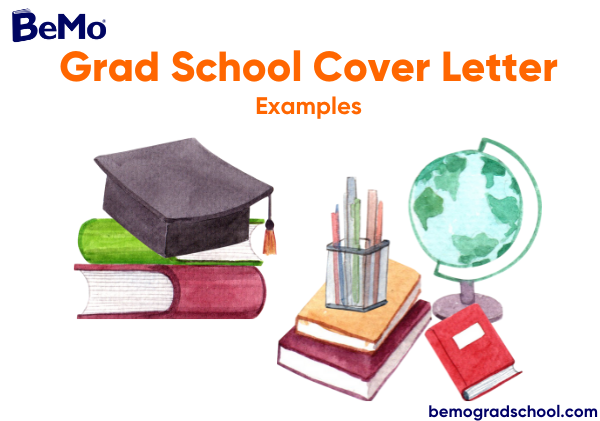
Looking at graduate school cover letter examples is a good idea if you plan on applying to a graduate school program, as you may be required to include a cover letter with your CV for graduate school and other application components. Even though it is not a required document for all grad school programs, a well-written graduate school cover letter can help you stand out to the admissions committee and improve your chances of being accepted into your chosen program. This is especially true if you are applying to a highly selective institution or trying to get into graduate school with a low GPA.
This blog will discuss everything you need to know about writing a cover letter for graduate school. You will learn why cover letters are important, learn tips to make your graduate school cover letter stand out, and you will get to review cover letter samples that will inspire you to write your own.
>> Want us to help you get accepted? Schedule a free strategy call here . <<
Article Contents 10 min read
What is a graduate school cover letter.
A graduate school cover letter is a brief letter that applicants attach to their graduate school application. Much like a work cover letter, such as a research assistant cover letter , for example, graduate school cover letters are meant to introduce you and your application to the reader. They give you an opportunity to make an excellent first impression, tell the admission committee that you are interested in their graduate school program and why you believe it is a good fit for you.
Graduate school cover letters have become less popular as graduate schools typically ask students to fill out their personal information and submit materials online. If you are sending specific application materials or your entire application by mail, then you will need to include a graduate school cover letter. Additionally, a few institutions, like the University of Illinois graduate college, for example, require students to submit a graduate school cover letter with their application, even when it is online.
Furthermore, even when a graduate program does not explicitly ask for a cover letter, including a well-written and informative letter can help differentiate you from the other students by leaving a lasting impression on the admission committee, thus increasing your chances of admission. That said, before you start writing a cover letter for such a program, you should verify the school's admissions website to ensure that the school accepts additional documents.
It should also be noted that many graduate students look for work and research opportunities at the school that they will be attending. If that is the case for you, then you will need a graduate school cover letter with your application for that school-related internship, job, or research opportunity. For example, if you’re interested in conducting research with a specific professor while you complete your master’s, then it would be a good idea to send them your application with a cover letter attached so that you can communicate your suitability for their research project.
Graduate school cover letters are academic letters, meaning that they need to be formatted in a way that is professional, clear, and concise. Your graduate school cover letter should be no longer than a page, written in a classic font that is easy to read, such as Times New Roman or Calibri, sized 11 or 12.
The text of your letter should be organized and separated into paragraphs. Keep in mind that your letter may go through several readers, and not all of them may be experts in the field you intend to study, so do not use overly technical language or industry-specific jargon. Keep your language succinct, clear, and consistent throughout the letter.
Lastly, your letter needs to provide a quick introduction to you as a candidate and pique the reader's interest so that they want to read the rest of your application. This means that you should not use your cover letter to list all of the experiences and skills that make you perfect for this graduate program. Simply express your interest in the program, select one or two experiences, skills, or values to focus on, and relate those to your suitability for the program you're applying for.
Wondering how to get into grad school with a lower GPA?
Step 1: Brainstorm & plan
The first thing you want to do before you start working on your cover letter, or any graduate school admission essay, is make a plan. Think about what you want to say in your cover letter and write it down. Remember that you only have a few paragraphs to work with, and you do not want to repeat information from your personal statement or other application components.
Once you know what you want your cover letter to say, organize it so that it flows nicely, and it is easy to follow. Your graduate school cover letter should follow the structure of a typical letter. It should have an introductory paragraph, the main body, and a closing paragraph.
Step 2: Address your letter
As mentioned earlier, your graduate school cover letter is, in fact, a letter! Therefore, you should begin by addressing it the way you would in a formal letter. Write your full name and mailing address at the very top. We also recommend including your email address and phone number, but this is optional. On the following line, write out the date, and then write the recipient's name (typically, this is the name of the head of the department or just the name of the school you are applying to) and their address. You should verify the school's admissions webpage for this information. If it is unclear and you are unsure whom to address in the letter, contact the school and ask for this information to ensure that your documents get to the right person.
This first section of your letter should follow this template:
1234 Imaginary Lane
NameofCity, TN 34421
December 12, 20XX
Dr. John Smith
Department of Psychology
BeMo Academic University
66 University Circle
NameofCity, TN 34457
Once again, because this is a formal letter, you want to open your letter with the appropriate greeting or a personal salutation. If you have the name of a specific recipient, you can use the most common salutation for graduate school cover letters, which is "Dear [recipient's name]." Do not forget to include the recipient's title if you have it. If you do not have the name of a specific recipient, then you can simply address the letter "To Whom It May Concern".
Step 4: Introduce yourself and express your interest in the graduate program
The reader will already have your name at the top of the page, but your introductory paragraph should tell them why you're writing this graduate school cover letter. You should use it to state your interest in your chosen graduate program and briefly mention your academic background and accomplishments thus far.
Take a look at this example for context:
I am pleased to submit my application for the Master of Applied Psychology program at X university. As a recent psychology graduate of YZ university, this graduate program is the perfect next step toward achieving my goal of becoming a clinical psychologist.
Step 5: Talk about your suitability for this program
This is the main body of your graduate school cover letter. You should try to limit this to one paragraph, but you can use up to two of them if necessary. You should briefly touch on why you chose this particular school and program, what skills you have that have prepared you for this program, and what makes you an ideal applicant.
You can talk about what you intend to do after this degree or specific professors and faculty members you wish to work with. The information you share here will be personal, so there is no golden template. Just ensure that it is written in an organized fashion that is easy to read and understand.
Step 6: Conclude and close your letter
In your last paragraph, make sure you thank the recipient for their time and consideration. You should also encourage them to reach out to you if they need additional information, or if they have any questions. Then finally, You can close your cover letter with a warm, professional closing salutation. "Sincerely" or "Warm Regards" followed by your name are some acceptable closing salutations you can use.
Step 7: List enclosed documents
This section of your graduate school cover letter will look different depending on the school you are applying to, and the application format used. If you are applying by mail, you should list the enclosed documents in the same envelope as your cover letter. If you are applying online or by email, verify that all of the documents listed on your cover letter are attached and ready to send.
This section should be at the very bottom of the page. It should list the documents in a bullet point format, in the order in which they are enclosed. The list should look something like this:
Sincerely,
Jane Doe
- Program application form
- Statement of purpose
- Academic transcripts
Letters of recommendation
Graduate school cover letter examples
Graduate school cover letter example #1.
Candice Williams
1234 Dream St.
Winnipeg, MB R3J 8T6
[email protected]
204-990-887
August 12, 20xx
Dr. Trevor Thorne
Department of English, Theatre, Film & Media
Toronto, ON M4C 2Y9
Dear Dr. Thorne,
I am excited to submit my application for consideration for the English literature master's program at BeMo Academic University. I have spent the past four years learning the basics of literature analysis through my bachelor's degree in the field, and I am eager to take this next step in my educational journey in order to further my training.
My undergraduate studies allowed me to explore and learn about different forms of literature from around the world. Still, I often found myself drawn to the impressive works of Shakespeare, Milton, Bronte, and many other great English writers. I had the opportunity to study in London for a year, where I attended a seminar on the impact of Charlotte Bronte's work on modern feminism led by none other than Prof. Jane Smith. She is one of the many brilliant professors in the English, Theatre, Film & Media department at BeMo that I hope to learn from.
You will find enclosed the required application documents, including my academic CV, which provides more information on the research I have been able to do and publish so far in my short academic career. I am especially interested in the role that authors such as William Shakespeare played in the development of modern English, and I wish to explore that further through research. I feel that the rigorous curriculum this program offers will inform my future writing and research efforts, and allow me to achieve my goals.
Thank you for your time, attention, and consideration. It is truly appreciated. Please do not hesitate to contact me if you require any additional information.
Program application form
Statement of purpose
Graduate CV
Official undergraduate transcripts
Angela Wong
102-9876 Mainland Rd.
New Haven, CT 44567
[email protected]
April 8, 20XX
University of BeMo
175 Academy lane
New York, NY 34567
To whom it may concern,
It is my pleasure to submit my application for the Master's degree in Early Childhood Development in the Psychology department at The University of BeMo. I am currently completing my bachelor's degree in psychology and plan to graduate in the fall. Since my goal is to pursue a career as an educational psychologist, this particular program is the perfect next step toward achieving my goal.
My undergraduate degree includes coursework in childhood psychology, special needs education, school and family crisis intervention, and many other courses that have given me the basics required to keep up with the thorough coursework that awaits me in your rigorous program.
I have also gained valuable knowledge in the field through shadowing and internships in different schools in my community. Observing other child educators at work confirmed that this is the right career path for me, and it motivated me anew to learn how I can best help children develop a love of learning from the early stages of their educational careers. I know that there is only so much I can learn from observing, and the fact that this program provides six months of hands-on training is one of the many reasons why I am hoping to be a student at BeMo next year.
Thank you for your time and consideration. Please do not hesitate to contact me if you require any additional information or documents. I look forward to hearing from you soon.
Research Interest Statement
Cover letters are supposed to be a brief introduction to your application, so unless otherwise specified by the school, they should not be longer than one page. We recommend sticking to three to four paragraphs, as this is long enough to share substantial information without losing your audience. Keep in mind that your reader will also be reviewing your other application components, so you do not need to address everything in this one letter. The information in your other application components, such as your statement of purpose , will complement your cover letter. So, treat your cover letter like a summary of your candidacy; keep it short but impactful.
Have you started working your graduate school CV? Check out this video for tips:
Be genuine & professional
The individual or committee that will review your application will probably be people that help run the program you're applying to. It is, therefore, best that they get a sense of who you genuinely are. Communicate honestly and let your personality shine through. This will help make your cover letter more memorable. That said, keep in mind that this is a professional document and that genuine does not mean informal or unprofessional. Your tone should still be courteous and consistent throughout the letter.
Proofread & edit carefully
We cannot stress how important this is. Remember that your graduate school cover letter will be one of, if not the first, document that the admissions committee will see from your application. You do not want their first impression of you to be negative. Your letter should be easy to read and follow, and it should be error-free.
Take the time to review your letter multiple times and edit for flow, grammar, spelling, punctuation, and typos. Better yet, reach out to a grad school essay tutor for assistance. They can review your cover letter and help you edit it to make sure it is up to par.
Grad school essay tutors can also help you with other tricky written application components, such as grad school career goals statements . So, do not hesitate to contact one if you need grad school application help. ","label":"Bonus tip","title":"Bonus tip"}]" code="tab1" template="BlogArticle">
It is a brief letter that you attach to your graduate school application. This letter should state your interest in the program, and briefly explain why you chose it, as well as why you are a good fit for it.
Many programs do not request graduate school cover letters, but they are more common than most people think. Additionally, several programs accept grad school cover letters even when not required, so you can still submit a cover letter to help your application stand out.
That depends on the program that you are applying to. Some schools may request a cover letter for online applications, and others may not require one, but they allow students to submit them as an optional component.
Graduate school cover letters are not replacements for admission essays like a personal statement or statement of intent . So if your school requires a graduate school cover letter, do not assume that this means you will not have to write any grad school admission essays.
Unless you are given the name of a specific member of the admission committee, you should address your graduate school cover letter to the "Admissions team," "[subject] Head of Department," or "To Whom It May Concern."
You can make your graduate school cover letter stand out by making sure your personality shines through in your writing, telling a short anecdote or interesting fact about you in the body of the letter, and detailing your relevant skills and experience.
Graduate school can be pretty competitive, but the level of competition depends on the specific program you will be applying to. Some programs have acceptance rates as high as 60%, while others admit less than 10% of applicants.
Graduate school advisors are admission experts who help students plan and prepare for graduate school applications.
Want more free tips? Subscribe to our channels for more free and useful content!
Apple Podcasts
Like our blog? Write for us ! >>
Have a question ask our admissions experts below and we'll answer your questions, get started now.
Talk to one of our admissions experts
Our site uses cookies. By using our website, you agree with our cookie policy .
FREE Training Webinar:
How to make your grad school application stand out, (and avoid the top 5 mistakes that get most rejected).
Time Sensitive. Limited Spots Available:
We guarantee you'll get into grad school or you don't pay.
Swipe up to see a great offer!
- A+ Resumes for Teachers
- Resume Samples
- Prices & Services
- Email: Candace Alstad-Davies
- Toll Free: 1-877-738-8052
- Local/Int’l: 780-513-0010

- Resume / Curriculum Vitae Help
- Application / Cover Letter Help
- Job Interview Questions & Answers
- Job Interview Preparation
- Social Networking & Job Search
- Education Job Search Tips
- Philosophy of Education Statement Help
- Career Changes to/from Education
- Career Development / Educational Skills
- International / Overseas Teaching
- ESL English as a Second Language
- Classroom Management Strategies
- Personal Development
- Higher Education Career Tips
- School Principal / Administrators Job Search Help
12 Excerpts from Sample Application Letters for Teacher Positions

How to write a cover letter, a.k.a. a letter of application for a teacher, that convinces the reader to move on to your resume and ultimately land a job interview. To help you, I’ve assembled hard-hitting excerpts from application letters for teaching positions.
Use your academic cover letter to introduce yourself as a professional educator, highlight your hands-on teaching experience, demonstrate your talents and skills, and portray your unwavering commitment to education. These various teacher application letters’ selections include individuals focusing on elementary education, special education, substitute teaching, and school administration.
A cover letter for a teaching position should be designed and written to showcase your greatest strengths as an educator. Display concrete examples of how you have actively engaged students, implemented creative lesson plans, and differentiated instruction.
Below you will find excerpts from the various sections that make up the sample application letters for teacher positions: introduction, body, and conclusion (or concluding paragraph). Remember that your letter’s structure is important: it should contain an introductory paragraph, one or two body paragraphs, and a concluding paragraph.
Sample Applicant Letters – Three Introduction Paragraphs
- It is with great pleasure to present my resume to you for a Special Education Teacher position with ABC School District. I have earned a Bachelor of Education in Elementary Education and Florida Teaching Certification. As a hardworking and dedicated teaching professional, I am confident in my ability to become a valuable member of your academic team.
- I am excited to present my well-rounded resume to you for the position of Elementary School Teacher. With a Master’s Degree in Education and 12 years of teaching expertise, I am confident in my ability to be an asset to your exceptional teaching team.
- With over ten years of hands-on teaching experience in the classroom, a Master of Art in Teaching Degree, and an Administrative Credential, I am eager to transition into Assistant Principal’s leadership role . My enclosed resume will demonstrate my commitment to education, excellent leadership skills, and my passion for academics.
Six Examples of Sentences in an Application Letter Body for a Teaching Position
- The enclosed resume will highlight my career accomplishments and showcase my expertise in education. I have had the opportunity to instruct a diverse student population, including those with ADD/ADHD, autism, developmental delays, learning disabilities, non-compliant behavior, and physical challenges. As a result, I possess the ability to remain calm, patient, and persistent. I administer frequent assessments, communicate regularly with parents, and adapt instructional techniques to facilitate students’ changing goals and needs.
- Being a versatile educator, I have had the fantastic opportunity to teach an academically and socially diverse group of children from grades one to five. I have developed excellent communication, interpersonal, organization, and problem-solving skills, enabling me to effectively teach any elementary grade level. I have proven my ability to adapt quickly to a changing student population while maintaining a well-behaved and focused learning environment.
- My teaching style is very flexible and student-focused. I take the time to get to know my students individually, allowing me to tailor my instruction according to their unique learning goals. I design adaptable lesson plans, exciting hands-on activities, and engaging thematic units to spark students’ interest, attention, and imagination.
- I facilitate student learning by developing innovative lessons that students can find relatable, understandable, and memorable. I utilize strategies centered on the latest research-based instruction to incorporate engaging activities effectively and relevant materials that capture my students’ interest.
- By integrating exciting technology, meaningful manipulatives, and cooperative learning projects, I have provided students with a well-balanced educational experience that promotes academic, social, cognitive, and physical development.
- My greatest strength as an educator is my ability to actively engage the class. By incorporating up-to-date technology, appropriate literature, and meaningful thematic units, I can effectively facilitate all learners’ types and levels while sparking their interest in education.
Three Examples of a Conclusion Found in Sample Application Letters for Teacher Postings
- Being a very innovative and dedicated educator, I welcome the opportunity to meet with you to discuss how my extensive experience and skills will benefit your academic program. Thank you for your time and consideration, and I look forward to hearing from you soon.
- As a collaborative and student-focused teacher, I welcome the chance to discuss how my expertise, skillset, and passion will benefit your academic program. Thank you for your time and attention, and I look forward to speaking with you soon.
- I am a resourceful, dedicated, and determined instructor willing to lead extracurricular activities. I am confident you will find me to be a valuable member of your team. I can be reached by telephone or email and welcome the opportunity to speak with you further.
With these examples, you will now have a great starting point from developing your academic application letter or cover letter. Use these example sentences to help you write a compelling letter that will get school districts’ attention.
Below you can view an application letter sample for an Education Consultant. It will provide you with a full version of how the letter should be written and formatted.
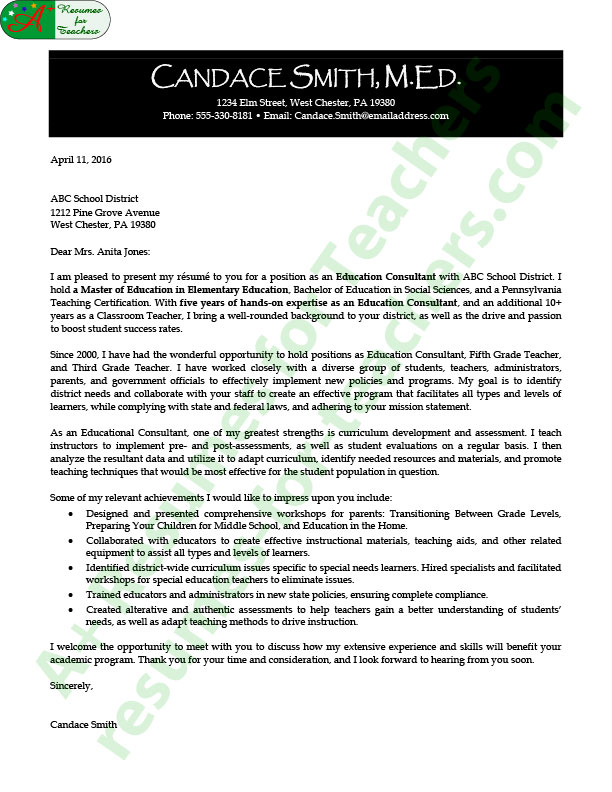
Whether you are writing a new teacher resume or an educational leadership resume , the font and design should match the application letter.
Do you need assistance with writing your academic resume or application letter?
As a professional resume writer with dual certification in resume writing, I know what it takes to grab potential schools’ attention.
When it comes to your future educational career, seeking out a career coach’s help is always a great idea.
We can help you with your teacher’s cover letter, resume, LinkedIn profile, interviewing skills, and numerous other services . Find out more about Candace Alstad – Davies .
Feel free to contact me or call 1-877-738-8052 to speak to me directly.
Next post: How to Discover Your Education Accomplishments to Write a Credible Resume
Previous post: 5 Ways an Application Letter for a Teacher Can Communicate Passion
Sign-up to receive free career tips and strategies
Search our site.
Popular Posts
Candace Alstad-Davies | Email: [email protected]
Fax: 775-593-3556 | Toll Free: 1-877-738-8052 | Local/Int’l: 780-513-0010
Prices & Services | Free Newsletter | Privacy Policy | About Us | Contact
© A+ Resumes for Teachers 2001 – 2023
Privacy Overview
- All Past Questions & Answers
- Download JAMB Past Questions
- Download WAEC Past Questions
- Post UTME Past Questions
- JAMB CBT APP
- JAMB Past Questions PDF
- JAMB Syllabus
- JAMB Brochure
- JAMB News JAMB latest news: Get all latest News, JAMB registration, JAMB CAPS, post UTME of various schools in Nigeria, JAMB Updates and all information you need regarding JAMB CBT exam and school admission is here.
- WAEC Latest News
- Post UTME News
Teaching job application letter examples (+ PDF and MS Word samples)
- September 24, 2021 September 24, 2021
- Career , Teaching
This article will show how to write write teacher jobs application letter so you increase your chances of landing the job. We’ll provide samples of teacher job application letter here and also in PDF and MS Word that you can use as a template.
- Tips for writing teacher job application letter
Sample application letter for teacher
- Download sample application letters for the post of teacher
Before getting start writing the application letter for teaching job, here are some tips that will help you do it best:
Tips for writing teacher job application cover letter
- Know about the school you’re applying for and the specific requirements for the job position
- Emphasise on your academic and extracurricular experience, especially as it applies to the job you’re applying for
- Highlight your experiences and accomplishments but as much as possible keep those relevant to the job you’re applying for
- As much as possible, know the name of the person you should address the letter to. It is better to use a name in the recipient’s address than to use some generic “Dear Sir/Madam”
- Proofread and do proper spelling checks before submitting the letter
- Use a suitable font such as Times New Roman, Arial or Calibri

Jumoke Lawson 123 Yaba Ugo Street Yaba Lagos [email protected]
September 24, 2021
Mr. Umar Kabiru Green Peak School 123 Main Street Victoria Island Lagos
Dear Mr. Umar,
I am interested in applying for a secondary teaching position in your school. As a graduate of Yaba College of Education, I have required teaching experience on the JSS 1, 2 and 3 level, in both Physics and Mathematics. I believe my years of teaching experience, coupled with my passion for community engagement make me an ideal candidate for this teaching position.
I am currently teaching JSS 2 students at Bright Stars Secondary School and I have experience teaching secondary school students in a variety of settings. Having held the position of education coordinator at my previous roles, I also have experience in management in the school system. Based on my understanding that this position requires a teacher with varied experiences in the school system, I think my varied experiences would make me a valuable asset for your school.
Part of your school’s mission is to engage students from diverse cultures. I have extensive experience incorporating teaching styles that promote cultural diversity and inclusion into my classrooms. For example, as a teacher at Bright Stars Secondary School, I helped the management incorporate Culture Times in the extracurricular activities for the students, which helps students learn about the different cultures of fellow students in a fun way.
My goal is to combine my wide experience and quality of being a compassionate and intelligent teacher to make positive contributions that will benefit your students, school district and community at large.
I hope to hear from you at your earliest convenience.
Sincerely, [signature hard copy letter] Jumoke Lawson
Don’t forget to download Teachers Registration Council Of Nigeria (TRCN) Past Questions and Answers .
Download application letters for the post of teacher in PDF and MS Word
Grab a free sample of Teacher Job Application Letter (MS Word) OR Teacher Job Application Letter (PDF) .
Wishing you all the best in your interview and that you ultimately land the job!
Share this:
- Click to share on Facebook (Opens in new window)
- Click to share on WhatsApp (Opens in new window)
- Click to share on Twitter (Opens in new window)
3 thoughts on “Teaching job application letter examples (+ PDF and MS Word samples)”
Nice letter
It is quite interesting
Doctor is more important than a teacher
Leave a Reply Cancel reply
Your email address will not be published. Required fields are marked *
Notify me of new posts by email.
Discover more from EduPadi Blog
Subscribe now to keep reading and get access to the full archive.
Type your email…
Continue Reading
- Advance Search
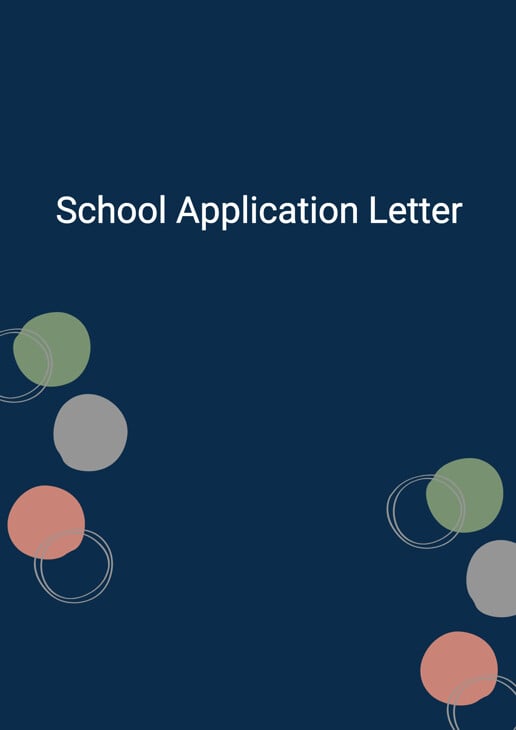
School Application Letter
Primary school.
Letter to primary school applying for school admission, with description of child’s current study, strength and list of extra-curricular activities
How to Tailor the Document for Your Need?
Create document.
Click "Create Document" button and the document will be prepared with your account details automatically filled in.
Fill Information
Please fill in any additional information by following the step-by-step guide on the left hand side of the preview document and click the "Next" button.
Get Document
When you are done, click the "Get Document" button and you can download the document in Word or PDF format.
Review Document
Please review the document carefully and make any final modifications to ensure that the details are correct before sending to the addressee.
Document Preview
Document description.
This letter should be used by parents to apply for primary school admission upon finishing kindergarten. It explains why their child is a good fit for the school and he/ she embodies the school's mission. This template can be used for application to primary schools with high reputations .
This letter should be addressed to the principal / headmaster / admission committee of the target school if parents wish to be given an opportunity for an interview.
The parent should attach required documents for application for easy referencing, such as copies of previous report cards, award certificates and identity documents.
Related Documents
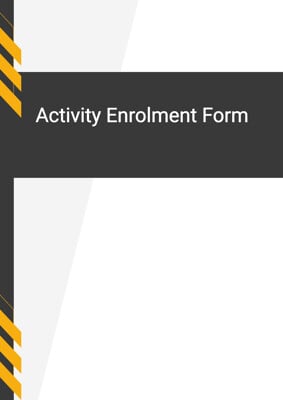
For Individual Participant
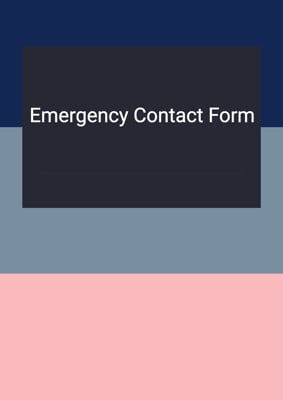
University Application
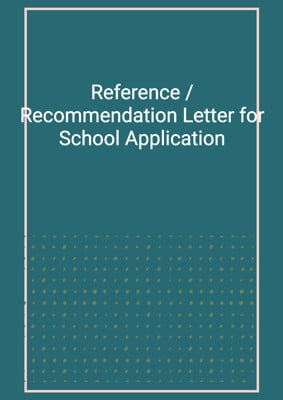
Kindergarten / Primary School
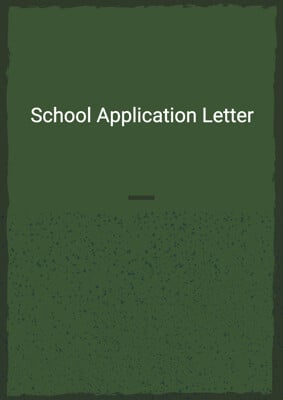
Class representative application
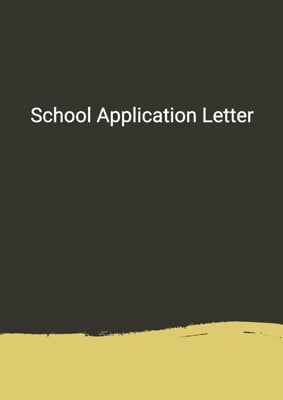
Follow Up Letter after Interview
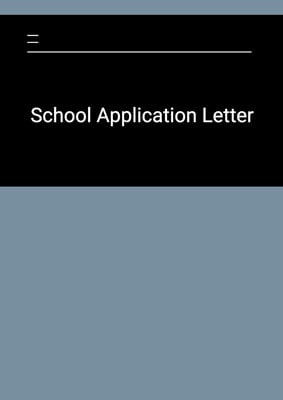
Kindergarten
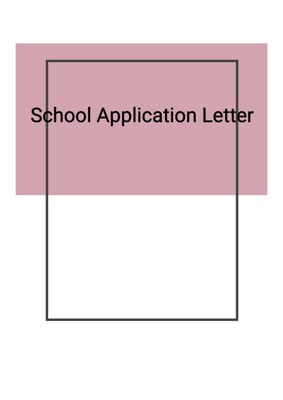
Request for Interview after Talk
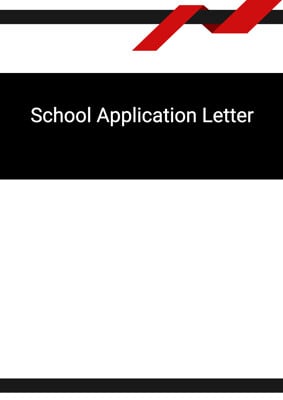
University / College
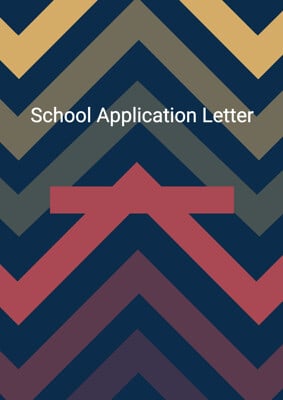
Waitlisted - Plea Letter to Principal

School Administrator Cover Letter Examples (Template & 20+ Tips)
Create a standout school administrator cover letter with our online platform. browse professional templates for all levels and specialties. land your dream role today.
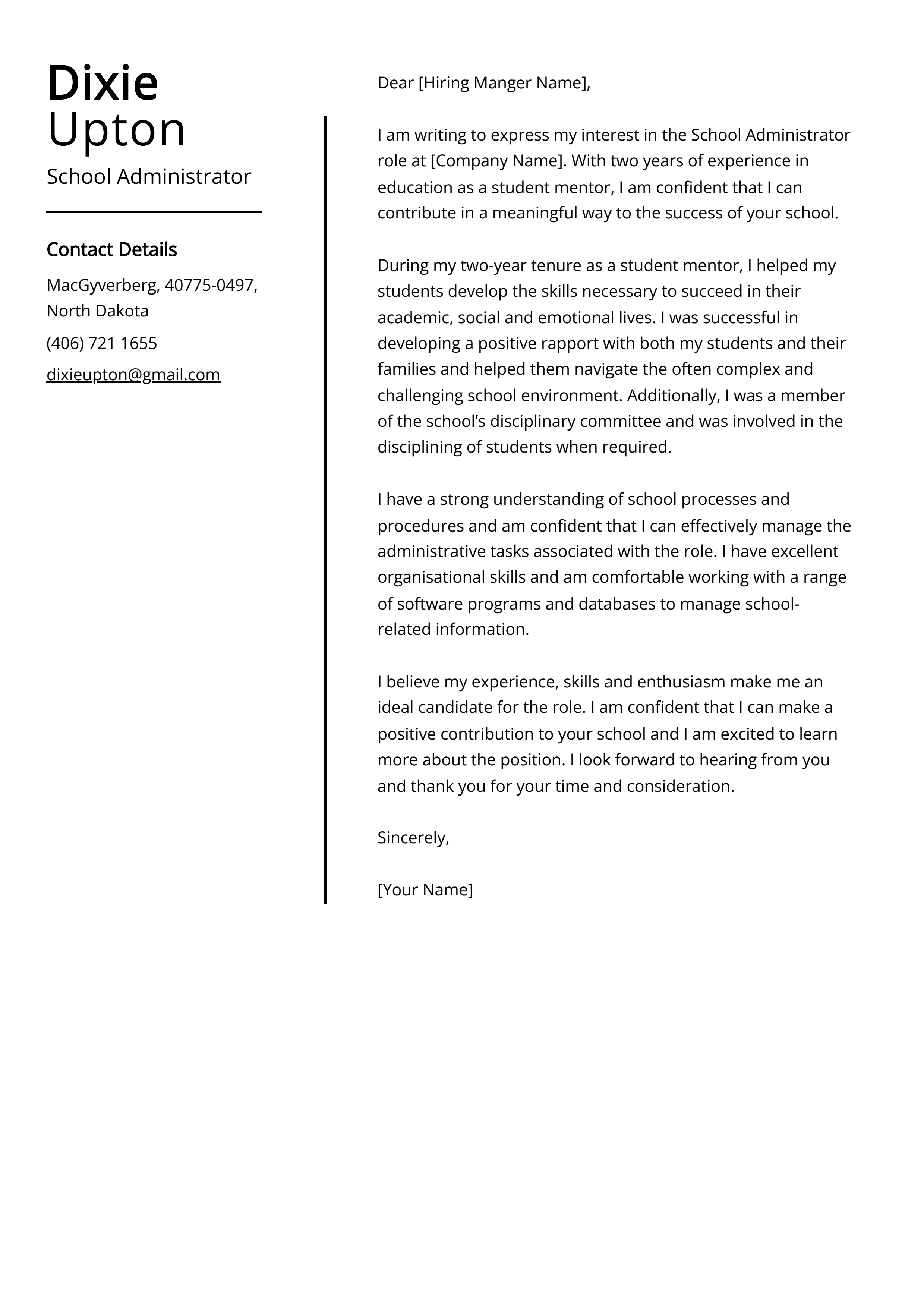
This guide will provide you with the essential knowledge to write a winning school administrator cover letter. With a few simple steps, you can create an impressive letter that will have school districts clamoring to meet with you and learn more about your qualifications. Follow our instructions and you'll be on your way to a successful job search!
We will cover:
- How to write a cover letter, no matter your industry or job title.
- What to put on a cover letter to stand out.
- The top skills employers from every industry want to see.
- How to build a cover letter fast with our professional Cover Letter Builder .
- What a cover letter template is, and why you should use it.
Related Cover Letter Examples
- Admissions Representative Cover Letter Sample
- Curriculum Developer Cover Letter Sample
- Swim Instructor Cover Letter Sample
- Dean Cover Letter Sample
- Experienced Massage Therapist Cover Letter Sample
- Counselor Cover Letter Sample
- Personal Fitness Trainer Cover Letter Sample
- Math Tutor Cover Letter Sample
- Infant Teacher Cover Letter Sample
- Hall Director Cover Letter Sample
- Admissions Advisor Cover Letter Sample
- High School Teacher Cover Letter Sample
- Student Advisor Cover Letter Sample
- Assistant Librarian Cover Letter Sample
- Educational Assistant Cover Letter Sample
- Education Specialist Cover Letter Sample
- Culinary Instructor Cover Letter Sample
- Corporate Trainer Cover Letter Sample
- Curriculum Coordinator Cover Letter Sample
- Experienced Kindergarten Teacher Cover Letter Sample
School Administrator Cover Letter Sample
Dear [Hiring Manager],
I am writing to express my interest in the School Administrator position at [Company Name]. After researching your school and reviewing the job description, I am confident I have the qualifications and experience to excel in this role.
Having worked as an administrator in the educational field for seven years, I have developed a comprehensive understanding of the needs of school administrators and the challenges associated with the role. In addition, I have a Master’s Degree in Education Administration and Leadership from [University Name], which has prepared me to thrive in this position.
My experience includes:
- Developing and implementing policies and procedures to ensure compliance with federal and state regulations.
- Managing staff, budgets, and resources in a school setting.
- Creating and monitoring budgets for school programs.
- Developing and maintaining relationships with parents, teachers, and other stakeholders.
- Organizing and leading professional development activities for staff.
- Collaborating with staff to create and implement student programs.
I am an organized, detail-oriented individual with excellent communication and interpersonal skills. I am comfortable working independently as well as in a team environment and I am confident I can make an immediate and positive impact on your school.
I am excited by the opportunity to join your team and make a positive difference in the lives of your students. I have included my resume and I look forward to discussing my qualifications in more detail.
Thank you for your time and consideration.
Sincerely, [Your Name]
Why Do you Need a School Administrator Cover Letter?
A School Administrator cover letter is an essential part of the job application process. It allows you to highlight your relevant skills and experiences, while demonstrating your enthusiasm and commitment to the role. Here are some reasons why you need a School Administrator cover letter:
- It allows you to stand out from other applicants.
- It gives you the opportunity to explain why you are the best candidate for the job.
- It enables you to demonstrate your knowledge of the role and the school.
- It highlights your relevant skills and experiences.
- It shows your enthusiasm and commitment to the role.
- It allows you to draw attention to any achievements or special qualities that make you an ideal candidate.
A Few Important Rules To Keep In Mind
- Keep the letter brief and to the point. It should not exceed one page.
- Start with your most relevant qualifications and highlight your experience in school administration.
- Show that you understand the position and demonstrate your commitment to the school’s mission and values.
- Be honest about your qualifications and experiences.
- Include a formal salutation and closing.
- Proofread your letter for spelling, grammar, and punctuation errors.
- Include your contact information in the closing.
What's The Best Structure For School Administrator Cover Letters?
After creating an impressive School Administrator resume , the next step is crafting a compelling cover letter to accompany your job applications. It's essential to remember that your cover letter should maintain a formal tone and follow a recommended structure. But what exactly does this structure entail, and what key elements should be included in a School Administrator cover letter? Let's explore the guidelines and components that will make your cover letter stand out.
Key Components For School Administrator Cover Letters:
- Your contact information, including the date of writing
- The recipient's details, such as the company's name and the name of the addressee
- A professional greeting or salutation, like "Dear Mr. Levi,"
- An attention-grabbing opening statement to captivate the reader's interest
- A concise paragraph explaining why you are an excellent fit for the role
- Another paragraph highlighting why the position aligns with your career goals and aspirations
- A closing statement that reinforces your enthusiasm and suitability for the role
- A complimentary closing, such as "Regards" or "Sincerely," followed by your name
- An optional postscript (P.S.) to add a brief, impactful note or mention any additional relevant information.
Cover Letter Header
A header in a cover letter should typically include the following information:
- Your Full Name: Begin with your first and last name, written in a clear and legible format.
- Contact Information: Include your phone number, email address, and optionally, your mailing address. Providing multiple methods of contact ensures that the hiring manager can reach you easily.
- Date: Add the date on which you are writing the cover letter. This helps establish the timeline of your application.
It's important to place the header at the top of the cover letter, aligning it to the left or center of the page. This ensures that the reader can quickly identify your contact details and know when the cover letter was written.
Cover Letter Greeting / Salutation
A greeting in a cover letter should contain the following elements:
- Personalized Salutation: Address the hiring manager or the specific recipient of the cover letter by their name. If the name is not mentioned in the job posting or you are unsure about the recipient's name, it's acceptable to use a general salutation such as "Dear Hiring Manager" or "Dear [Company Name] Recruiting Team."
- Professional Tone: Maintain a formal and respectful tone throughout the greeting. Avoid using overly casual language or informal expressions.
- Correct Spelling and Title: Double-check the spelling of the recipient's name and ensure that you use the appropriate title (e.g., Mr., Ms., Dr., or Professor) if applicable. This shows attention to detail and professionalism.
For example, a suitable greeting could be "Dear Ms. Johnson," or "Dear Hiring Manager," depending on the information available. It's important to tailor the greeting to the specific recipient to create a personalized and professional tone for your cover letter.
Cover Letter Introduction
An introduction for a cover letter should capture the reader's attention and provide a brief overview of your background and interest in the position. Here's how an effective introduction should look:
- Opening Statement: Start with a strong opening sentence that immediately grabs the reader's attention. Consider mentioning your enthusiasm for the job opportunity or any specific aspect of the company or organization that sparked your interest.
- Brief Introduction: Provide a concise introduction of yourself and mention the specific position you are applying for. Include any relevant background information, such as your current role, educational background, or notable achievements that are directly related to the position.
- Connection to the Company: Demonstrate your knowledge of the company or organization and establish a connection between your skills and experiences with their mission, values, or industry. Showcasing your understanding and alignment with their goals helps to emphasize your fit for the role.
- Engaging Hook: Consider including a compelling sentence or two that highlights your unique selling points or key qualifications that make you stand out from other candidates. This can be a specific accomplishment, a relevant skill, or an experience that demonstrates your value as a potential employee.
- Transition to the Body: Conclude the introduction by smoothly transitioning to the main body of the cover letter, where you will provide more detailed information about your qualifications, experiences, and how they align with the requirements of the position.
By following these guidelines, your cover letter introduction will make a strong first impression and set the stage for the rest of your application.
Cover Letter Body
As a school administrator, I am committed to the success of every student. My experience in the education field has prepared me to excel in this role.
I have a successful track record of developing and implementing strategies to improve academic outcomes. I have a deep understanding of the curricula and assessment practices, and I am adept in leading teams of educators to achieve their goals. As a leader, I consistently foster an environment of collaboration and respect. I have experience working with diverse student populations and recognize the importance of creating an inclusive environment that celebrates different cultures and perspectives.
I possess excellent communication and interpersonal skills, allowing me to collaborate effectively with other administrators, teachers, and parents. I have a strong background in budgeting and financial management, and I am confident in my ability to manage resources efficiently. I am also well-versed in the use of technology to support instruction and the development of creative solutions to complex problems.
My commitment to excellence in education is unwavering, and I am eager to join your team to help create a successful learning environment for your students. I look forward to discussing how my qualifications and experience can benefit your school.
- Administration of school operations
- Curriculum development and assessment
- Leadership and collaboration
- Communication and interpersonal skills
- Budgeting and financial management
- Technology integration and problem solving
Thank you for your consideration. I am confident that I can make a positive contribution to your school.
Complimentary Close
The conclusion and signature of a cover letter provide a final opportunity to leave a positive impression and invite further action. Here's how the conclusion and signature of a cover letter should look:
- Summary of Interest: In the conclusion paragraph, summarize your interest in the position and reiterate your enthusiasm for the opportunity to contribute to the organization or school. Emphasize the value you can bring to the role and briefly mention your key qualifications or unique selling points.
- Appreciation and Gratitude: Express appreciation for the reader's time and consideration in reviewing your application. Thank them for the opportunity to be considered for the position and acknowledge any additional materials or documents you have included, such as references or a portfolio.
- Call to Action: Conclude the cover letter with a clear call to action. Indicate your availability for an interview or express your interest in discussing the opportunity further. Encourage the reader to contact you to schedule a meeting or provide any additional information they may require.
- Complimentary Closing: Choose a professional and appropriate complimentary closing to end your cover letter, such as "Sincerely," "Best Regards," or "Thank you." Ensure the closing reflects the overall tone and formality of the letter.
- Signature: Below the complimentary closing, leave space for your handwritten signature. Sign your name in ink using a legible and professional style. If you are submitting a digital or typed cover letter, you can simply type your full name.
- Typed Name: Beneath your signature, type your full name in a clear and readable font. This allows for easy identification and ensures clarity in case the handwritten signature is not clear.
Common Mistakes to Avoid When Writing a School Administrator Cover Letter
When crafting a cover letter, it's essential to present yourself in the best possible light to potential employers. However, there are common mistakes that can hinder your chances of making a strong impression. By being aware of these pitfalls and avoiding them, you can ensure that your cover letter effectively highlights your qualifications and stands out from the competition. In this article, we will explore some of the most common mistakes to avoid when writing a cover letter, providing you with valuable insights and practical tips to help you create a compelling and impactful introduction that captures the attention of hiring managers. Whether you're a seasoned professional or just starting your career journey, understanding these mistakes will greatly enhance your chances of success in the job application process. So, let's dive in and discover how to steer clear of these common missteps and create a standout cover letter that gets you noticed by potential employers.
- Not addressing the letter to the appropriate person or department.
- Failing to demonstrate knowledge of the school and its mission.
- Making spelling and grammar mistakes.
- Not providing specific examples of relevant experience.
- Not tailoring the letter to the school and position.
- Including irrelevant information.
- Using vague language or cliché phrases.
- Not providing contact information.
- Using an unprofessional tone.
Key Takeaways For a School Administrator Cover Letter
- Highlight your experience in the education field
- Emphasize your ability to manage a school and its staff
- Showcase your understanding of the school’s culture and mission
- Mention any relevant certifications or accomplishments
- Demonstrate your knowledge of current teaching methods and technologies
- Provide examples of successful initiatives you’ve implemented
- Explain how you can help the school reach its goals
- Demonstrate your leadership, communication, and problem-solving skills


COMMENTS
School application letter example Here is an example of a school application letter to further help you compose yours. Stacy Nolan 777-777-7777 [email protected] 7777 Denver Avenue 8888 Denver, Colorado 14th April 2021 Dr. Simon Morgan Sun and Shield School of Music 9999 Lights Street 8888 Denver, Colorado Dear Dr. Morgan, REF: Application for Admission to the School of Oriental Music My ...
SAMPLE LETTER. [Subject: Normally bold, summarizes the intention of the letter] -Optional-. Dear [Recipients Name], I am writing to express my desire to enroll in your prestigious school for this coming school year. I believe that I am highly qualified and deserve to go to your honorable school because (list down the various positive qualities ...
Step 3: Highlight Key Attributes and Achievements. Discuss your child's attributes, interests, and accomplishments. Connect these with how they can contribute to and benefit from the school. Tip: Use specific examples to illustrate your points. Real-life instances make your letter more personal and impactful.
Apply 1-inch margins on all sides of the document. Set regular cover letter spacing, which is double between paragraphs and 1-1.15 between lines of text. Make your school letter of intent one-page long—this is the typical cover letter length, and it's perfect for this kind of document. Align the text to the left side.
Sample. In this school application letter sample a student introduces herself to the head of student admissions. She states why she believes she is a good candidate for the school's art program and includes a paragraph that emphasizes her dedication, skills and personal strengths. In the closing paragraph she includes a statement of ...
28 February 2023. Jamie Hart 929 Commerce St Stockton, CA 95202 (209) 984-3632 [email protected]. Dear Mr. Hart, My name is Daria, and I am a graduating senior at Heritage High School. I saw your posting for the position of Business Development Intern on Indeed, and was immediately compelled to apply. My academic and career goals align with ...
A strong sample college application letter of continued interest includes four elements. First, reaffirm your interest in attending the school if offered the chance to matriculate. Then, discuss relevant developments to your application, such as additional extracurricular accolades and continued academic successes.
Sample College Admission Application Letter. Here is a sample letter based on the format above. You can use this sample to help you understand how to write your perfect college admissions application letter. Elizabeth Ann Montgomery. 2000 South Meridian Avenue. Los Alamos, NM 89776. March 22, 2039. Mrs. Janice Emory. University of Olympia
Use a formal closing. When you get to the end of your letter, add a space, then include a closing, like "Sincerely" and sign your name. [11] Sometimes, it's appropriate to type your name, then print out the letter and sign it in pen. That can be a nice touch. 5. Put your contact information in the header.
Your high school cover letter should usually have five sections, in this order: 1. Heading. At the top of the page, include: Your name and contact information. The date. The recipient's name, title, company, and contact information (when available) (Note: Feel free to omit this section if you send your letter by email and your contact details ...
This is an example of a good job application letter header: 2. Address the hiring manager. The next part of your cover letter is the contact person's information and a salutation (also called a greeting). To get started, write the hiring manager's contact information at the top-left of your letter of application, including their name ...
Key Points. When writing your cover letter for graduate school applications, make sure to: Use the correct formatting: elegant font, margins, spacing, a clear header with all the information. State the graduate program you're applying to, your previous education background, and the reason for you applying.
Dear [Recipients Name], I am writing to you to inform you of my desire to enter your prestigious school for my high school education. You will find enclosed the necessary documents to support my application. Also, you will find that I am very much qualified to enter your school due to my various merits such as: (insert values here) I look ...
The school letter of intent, which is also referred to as the statement of purpose, is a type of cover letter that you attach to your school application. In this letter, you're required to include details about your academic, personal, and extra-curricular achievements. With that said, the contents you can choose to have in this letter ...
DSC Company. 68 Delaware Road. Bloomsbury, CA 09045. (090) 656-87878. Date. Dear Ms. Micheal, I am writing this letter to apply for a junior programmer position advertised in your organisation. As requested, I am enclosing a completed job application, my certificates, my resumes, and four references in this letter.
A graduate school cover letter is a brief letter that applicants attach to their graduate school application. Much like a work cover letter, such as a research assistant cover letter, for example, graduate school cover letters are meant to introduce you and your application to the reader. They give you an opportunity to make an excellent first ...
Formal Letter Writing Example 2: Sick Leave Application for School. Imagine you were suffering from a fever. Without informing your school, you took leave. Now write a sick leave application for the school teacher for fever which you have already taken. Understand the application format for the school formal letter from the following sample letter:
I am excited to present my well-rounded resume to you for the position of Elementary School Teacher. With a Master's Degree in Education and 12 years of teaching expertise, I am confident in my ability to be an asset to your exceptional teaching team. With over ten years of hands-on teaching experience in the classroom, a Master of Art in ...
Sample application letter for teacher. September 24, 2021. Dear Mr. Umar, I am interested in applying for a secondary teaching position in your school. As a graduate of Yaba College of Education, I have required teaching experience on the JSS 1, 2 and 3 level, in both Physics and Mathematics. I believe my years of teaching experience, coupled ...
A school application letter (primary school) is a document expressing the interest of an individual's application for admission. In this letter, an applicant usually highlights his/her experience and explains the motivations for applying to this school. The motivations may be linked to the school's culture, teaching philosophy or other ...
Show that you understand the position and demonstrate your commitment to the school's mission and values. Be honest about your qualifications and experiences. Include a formal salutation and closing. Proofread your letter for spelling, grammar, and punctuation errors. Include your contact information in the closing.